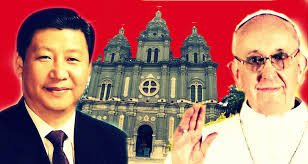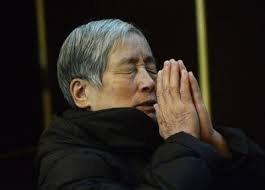His predecessors and St Francis of Assisi show Pope Francis the way to China
Verbiest Institute KULeuven, Verbiest Institute Taipei And Chinese College Leuven
 His predecessors and St Francis of Assisi show Pope Francis the way to China
His predecessors and St Francis of Assisi show Pope Francis the way to China
These days Pope Francis will find on his desk dozens of dossiers which he will have to study and decide upon. One of them is the rather complicated and delicate question of “how to deal with the Church in China and how to relate to the Chinese government?” Relations between Rome and Beijing have been problematic since 1951. At one time (2008-2010) dialogue was going on showing some positive results in a mutual agreement on the appointment of ten bishops; but that dialogue was broken off again since 2010. Since 2011 three bishops were even excommunicated.
No doubt, also in dealing with this delicate matter the new pope will be inspired by the spirit of his patron Saint Francis who, in the history of the Church was a pioneer of dialogue. Already in the 12th century he went from Italy to the Middle East to engage in dialogue with the Mohammedans who were at that time the staunch opponents of the Church. In our time Communism has been the staunch opponent of the Church in China. Pope Francis will have to deal with this matter. He will find inspiration in the way his predecessors approached China.
Already 43 years ago (in 1970) Pope Paul VI walked the way of dialogue with China
Inspired by Vatican II, Pope Paul VI wrote an encyclical on dialogue -- Ecclesiam Suam (1964) – and he also started concretely walking that way at a time which was even more critical for the Church than ours. Indeed in 1965 the Cultural Revolution started in China. The communist regime destroyed and closed churches, arrested bishops, priests and faithful putting them in prison. In the logic of any political leader this would call for confrontation.  But the pope, guided by the logic of the gospel sought reconciliation and unity. He demonstrated this clearly in 1970 when he visited the Food & Agricultural Organization in Rome where he pleaded that China should be accepted in the UNO. China responded on July 11, 1970 by releasing the American Maryknoll Bishop James Walsh who had been detained in China for 15 years.
But the pope, guided by the logic of the gospel sought reconciliation and unity. He demonstrated this clearly in 1970 when he visited the Food & Agricultural Organization in Rome where he pleaded that China should be accepted in the UNO. China responded on July 11, 1970 by releasing the American Maryknoll Bishop James Walsh who had been detained in China for 15 years.
That same year Paul VI planned to visit Australia and the Far East from where he wanted to send another positive signal to China. That was not evident because the internuncio of the Vatican – who had been expelled from China [1951] – stayed in Taipei. But, apparently, Rome knew about the plans of President Nixon to open an embassy in Beijing. In October 1970, well before his visit to Australia, Paul VI appointed Mgr Luigi Accogli, then internuncio in Taipei, to Ecuador without appointing a successor in Taipei. That was meant as a positive gesture towards China. Moreover the pope, together with his Secretary of State Cardinal Cassarole, planned a stopover in Hong Kong during his visit in the Far East. That would become yet another positive signal for China. But from Taiwan civil as well as Church authorities insisted strongly, through diplomatic channels, that the pope should change his plans and make a stopover in Taipei instead of Hong Kong. The pope did not change his itinerary but as a gesture to Taiwan he appointed on October 28, Mgr. Edward Cassidy (later Cardinal Cassidy), as new internuncio in Taipei. That satisfied partly the expectations of Taiwan but the Taiwan media continued to publish critical comments on the stopover in Hong Kong.
The pro-China media in Hong Kong, influenced by Beijing, remained silent about the planned Hong Kong stopover of the Pope. The pro-Taiwan media in Hong Kong however, criticized in sharp language. They understood all too well that the pope, right at the border of China, wanted to reach out to China, possibly as a step towards renewing diplomatic relations. As a result of all the critique – possibly also after some signals from Great Britain, the then colonial power in Hong Kong – the pope felt obliged to drop the greeting to China which was included in the prepared text of his homily during the Eucharistic celebration with Hong Kong Catholics in the Happy Valley soccer stadium. I stood at about 5 m. distance during the homily. It was very clear, all what the pope could do was, after he had greeted the Catholics of Hong kong, raising his voice while saying slowly …”…and I greet all the Chinese people wherever they may be…”….. Paul VI had wanted to say more.
Shortly after the Hong Kong visit Msgr. Edward Cassidy presented his credentials in Taipei to President Jiang Kai-Shek [December 1970]. But only ten months later – just a few weeks before China replaced Taiwan in the UNO [26 Oct. 1971] – Msgr. Cassidy was called back from Taipei “for consultation” so it was said……but his return was postponed “sine die” (for an undetermined time). In fact he never went back, not even after several attempts from Taiwan to still obtain the return of the internuncio. In 1972 Msgr. Bacqué was appointed as temporary observer at the Vatican embassy in Taipei. On June 30, 1972, at the celebration of the 9th anniversary of the coronation of Pope Paul VI, the topic talked about by all invited guests was: their common expectation that the same celebration the following year would most probably take place in Beijing. Later that same year Rome appointed Msgr. Francesco Colasuono as “Chargé d’Affaires ad interim”. Today, more than forty years later, the present representative of the pope in Taipei – Msgr. Paul Russel – still has the same function and title. During all those years there have been highs and lows in the relations between Rome and Beijing as well as in our hope for normalization of diplomatic relations.
The aim of diplomatic relations of the Vatican with any country is to promote the good of the local Church. Priority concern goes to favoring evangelization and pastoral of the particular Churches. That has been the guiding principle of the popes through the centuries. That’s what distinguishes Vatican diplomacy from that of other countries. China is obviously an important country for evangelization today and will be so in the future. It is therefore important for the Vatican to have relations with China and consequently to do what it takes to prepare such relations. When in 1958 Bishop Dong Guangqing (Wuhan) was illegally ordained a bishop by the Patriotic Association in China Pius XII condemned the act referring to the excommunication “latae sententiae” prescribed by Canon Law but without promulgating it and therefore without applying it. He also avoided entering into further open polemics with China. Pope John Paul II had many reasons to enter into confrontation with China when on Epiphany 2000 five bishops were illegally ordained and afterwards when China used insulting and aggressive language reacting against the canonization of 120 Chinese martyrs by the pope. But Pope John Paul II avoided all confrontation. He went even as far as apologizing, but not the apology which Beijing wanted to impose on him. He apologized only “for what happened in the 19th century and what possibly may have caused pain and injustice to some Chinese”. Nothing more!
All these were positive signals from the popes to China. Theirs was not a policy of appeasement and compromising aspects of faith, but a courageous search for dialogue in mutual respect in the spirit of the gospel. The response to these signals from the side of China was disappointing. The popes had expected a more magnanimous attitude of China. But Pope John Paul II and Pope Benedict XVI persevered following the line of Pope Paul VI searched patiently for dialogue. This history in itself carries a message and an invitation for the new leaders in China and for Pope Francis.
The content of this message can be better understood from the life of Saint Francis of Assisi. In trying to realize his dream to enter into dialogue with Islam Francis of Assisi encountered many problems. The five brothers he sent to Morocco in 1212 were murdered. When he himself tried to join them travelling from Spain he had to abandon it because of health problems; even his visit to Egypt and Palestine did not produce the fruits he had hoped for; and on top of it all he had to deal with internal discord among his friars. Pope Francis may experience also that dialogue with China will not bring quick success and he too may find out that there are different opinions in the Church on entering into dialogue or not. But it is in line with the spirit of Saint Francis not to give in to the temptations to enter into confrontation, because that will lead only to more division. By persevering in seeking dialogue, reconciliation and unity Pope Francis will meet Saint Francis and also the popes who preceded him. In fact that’s where we all meet with what Christ preaches in the gospel.
Jeroom Heyndrickx cicm
- What hope for the faith school?
- The Internet Must Transmit A Church Which Is Home To All
- The daunting journey from faith to faith
- Goa still a 'battery' of Catholicism for Asia
- Measure of compromise
- China's Communist Party to hold meeting on religion
- A vision for the church in India
- Clegg welcomes Churches' election guidance
- In England and Wales: 'Parishes are enriched by migrant communities'
- The Holy See Responds to the Cloyne Report.


 Votes : 0
Votes : 0









